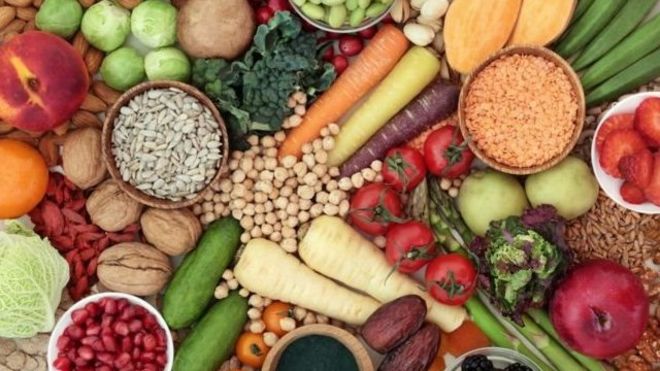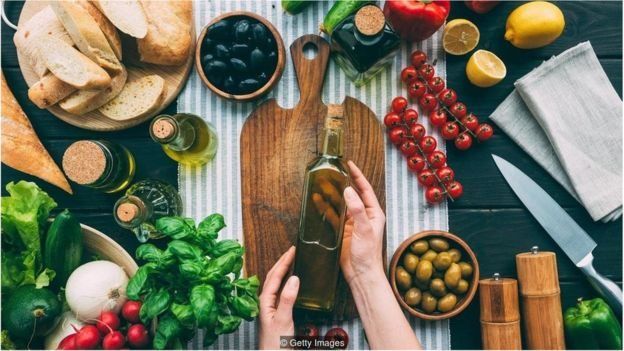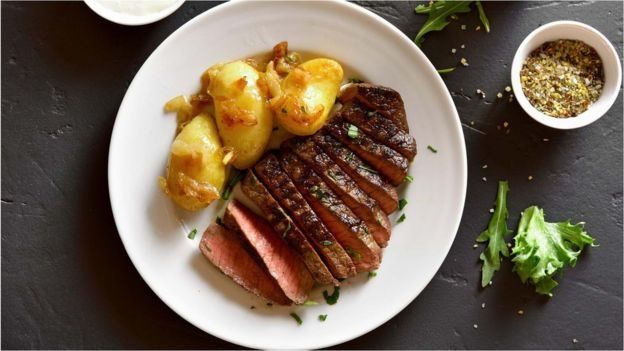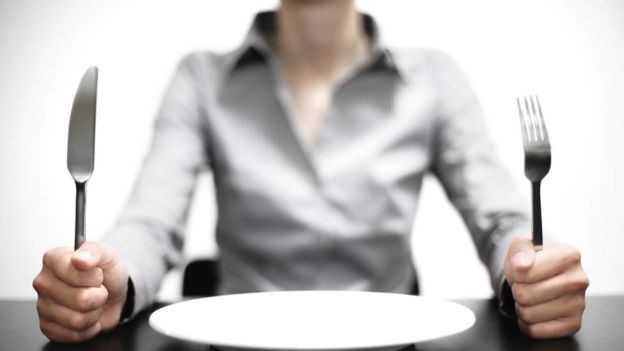饮食与健康:素食与纯素食者中风风险或许更高
 图片版权 Getty Images
图片版权 Getty Images
近年来,越来越多的人开始成为素食者,因为人们觉得以素食为主的饮食更加健康。
但英国最近一项研究显示,那些素食与纯素食者中风的风险可能会更高。
该项研究结果发表在《英国医学杂志》上。 研究人员跟踪了近5万人,历时18年之久。
研究发现,同肉食者相比,素食和纯素食者每1000人中会增加3例中风病例。
与此同时,同肉食者相比,在素食和纯素食者中,心脏病病例每1000人中则减少10例。
在长达18年的随访中,志愿者需要填写他们每天的饮食、医疗史、是否吸烟以及每天的活动量等。
在调查过程中,志愿者中有近3000人得了冠心病、1000多人中风,其中包括300例脑溢血。
虽然,那些只吃鱼类产品、素食和纯素食志愿者中患心脏病的比例比食肉志愿者低,但他们中风风险却比食肉者高出20%。
其中原因
 图片版权 Getty Images
图片版权 Getty Images
这到底是为什么呢?
研究人员认为,这可能与素食者体内维生素B12水平较低有关。但科研人员说,对此还需要进一步的研究。
然而,该研究无法证明它是否完全取决于饮食或者与其他生活方式不同有关?
同时,还有一种可能性是它跟人们的饮食毫无关系。很可能是不吃肉的人生活方式与肉食者大相径庭的缘故。
因果关系
 图片版权 Getty Images
图片版权 Getty Images
那么,这是否意味着素食和纯素食饮食不健康呢?
英国营养协会的菲利普博士认为,不应该这样理解。她说,虽然二者之间有联系,但并不是因果关系。
菲利普博士表示,它给人们传达的一个最重要的信息是,要均衡饮食,食物种类越多越好。
但她也指出,那些以肉食为主的人也要注意,并不是他们的饮食就保险。因为有些肉食者进食种类很单一,比如,每晚只吃肉和土豆,不吃蔬菜。显然,这也不是最佳饮食。
饮食变化
由于该调查数据跨越了近20年,在这期间人们的饮食也在不断发生变化。
例如,菲利普博士说,今天素食者和纯素食者的饮食与20、30年前素食者的食谱相比已经大不相同。
不但如此,菲利普博士表示,今天人们对食用加工食品及红肉与健康风险之间的联系有了更多的了解,特别是它与肠癌风险之间的联系。
饮食均衡
 图片版权 Getty Images
图片版权 Getty Images
营养专家认为,无论人们选择何种饮食,最关键的是要多样化,饮食均衡对健康最有益。
因此,英国NHS在膳食指南(the Eatwell Guide)中希望人们能够每天:
- 至少吃5份水果和蔬菜
- 主食以高纤维的淀粉食物为主,例如土豆、面包、米饭和面食。
- 不要忘了蛋白质食品,包括瘦肉、鱼肉、海鲜、豆类、豆腐和无盐坚果
- 乳制品和乳制品替代产品
- 少量和少吃脂肪、糖或盐含量较高的食物
 图片版权 Getty Images
图片版权 Getty Images
此外,素食者和纯素食者还要特别注意吸收某些特定营养,比如胆碱,以保持大脑健康。
胆碱是人体正常生长、发育和维持各项身体功能健康运作的必需营养素,在生长发育过程中扮演着重要角色。
同时,不要忘了维生素B12。
通常,肉食者会从奶制品、肉类和鱼类中摄取足够的维生素B12。维生素B12对维持健康血液和神经系统至关重要。
然而,纯素食者中有可能会出现维生素B12不足或低下的情况。
铁也是一种不太容易从植物性食物中吸收的元素。所以素食者需要确保在饮食中包括全麦面包和面粉、干果和豆类等食品。
相关原始研究链接:
https://www.bmj.com/content/366/bmj.l4897
Abstract
Objective To examine the associations of vegetarianism with risks of ischaemic heart disease and stroke.
Design Prospective cohort study.
Setting The EPIC-Oxford study, a cohort in the United Kingdom with a large proportion of non-meat eaters, recruited across the country between 1993 and 2001.
Participants 48 188 participants with no history of ischaemic heart disease, stroke, or angina (or cardiovascular disease) were classified into three distinct diet groups: meat eaters (participants who consumed meat, regardless of whether they consumed fish, dairy, or eggs; n=24 428), fish eaters (consumed fish but no meat; n=7506), and vegetarians including vegans (n=16 254), based on dietary information collected at baseline, and subsequently around 2010 (n=28 364).
Main outcome measures Incident cases of ischaemic heart disease and stroke (including ischaemic and haemorrhagic types) identified through record linkage until 2016.
Results Over 18.1 years of follow-up, 2820 cases of ischaemic heart disease and 1072 cases of total stroke (519 ischaemic stroke and 300 haemorrhagic stroke) were recorded. After adjusting for sociodemographic and lifestyle confounders, fish eaters and vegetarians had 13% (hazard ratio 0.87, 95% confidence interval 0.77 to 0.99) and 22% (0.78, 0.70 to 0.87) lower rates of ischaemic heart disease than meat eaters, respectively (P<0.001 for heterogeneity). This difference was equivalent to 10 fewer cases of ischaemic heart disease (95% confidence interval 6.7 to 13.1 fewer) in vegetarians than in meat eaters per 1000 population over 10 years. The associations for ischaemic heart disease were partly attenuated after adjustment for self reported high blood cholesterol, high blood pressure, diabetes, and body mass index (hazard ratio 0.90, 95% confidence interval 0.81 to 1.00 in vegetarians with all adjustments). By contrast, vegetarians had 20% higher rates of total stroke (hazard ratio 1.20, 95% confidence interval 1.02 to 1.40) than meat eaters, equivalent to three more cases of total stroke (95% confidence interval 0.8 to 5.4 more) per 1000 population over 10 years, mostly due to a higher rate of haemorrhagic stroke. The associations for stroke did not attenuate after further adjustment of disease risk factors.
Conclusions In this prospective cohort in the UK, fish eaters and vegetarians had lower rates of ischaemic heart disease than meat eaters, although vegetarians had higher rates of haemorrhagic and total stroke.
Fig 1
Rates of ischaemic heart disease and stroke in fish eaters and vegetarians (including vegans) compared with meat eaters in the EPIC-Oxford study (n=48 188). Meat eaters were participants who reported eating meat, regardless of whether they ate fish, dairy, or eggs; fish eaters were participants who did not eat meat but did eat fish; and vegetarians included vegans. Meat eaters were used as the reference group throughout. All analyses included age as the underlying time variable; were stratified by sex, method of recruitment (general practice or postal), and region (seven categories); and were adjusted for year of recruitment (per year), education (no qualifications, basic secondary (eg, O level), higher secondary (eg, A level), degree, unknown), Townsend deprivation index (quarters, unknown), smoking (never, former, light, heavy, unknown), alcohol consumption (<1, 1-7, 8-15, ≥16 g/day), physical activity (inactive, low activity, moderately active, very active, unknown), dietary supplement use (no, yes, unknown), and oral contraceptive and hormone replacement therapy use in women. P heterogeneity=significance of heterogeneity in risk between diet groups based on Wald tests. Box sizes are proportional to the number of cases in each group
